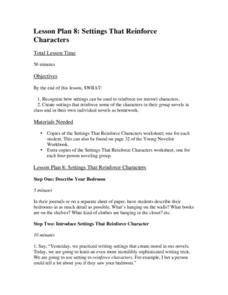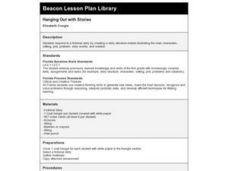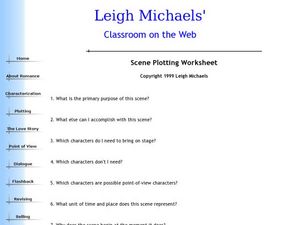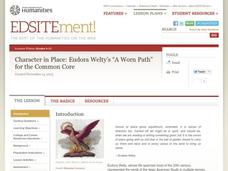Curated OER
Interpreting Characters, Setting, Plot, and Theme - The Triangle Shirtwaist Factory Disaster
Examine story development and historical disaster with your class. Learners view a video depicting the incidents surrounding The Triangle Shirtwaist Disaster. They use graphic organizers and the Internet to gather enough information to...
Curated OER
Picture-Perfect Story Settings
Using common picture books, teachers can help learners develop the setting for their next creative writing projects.
Curated OER
Elements of a Story - Plot, Characters, and Setting
Use this SMART board activity with any short story in your unit plan. The SMART board file contains a step-by-step guide to plot diagrams, including an interactive practice page and an assignment. This resource is beneficial for language...
La Jolla High School
Setting--Painting the Background
Setting and description are important parts of John Steinbeck's novel Of Mice and Men. Ask your class to examine how he sets the scene with this graphic organizer. Individuals or groups look at several different aspects of the setting in...
Curated OER
Setting Worksheet
Set your class up for success with writing descriptive settings with these two graphic organizers. On the first page, writers note specifc details about their chosen setting and comment on how each character views the setting. The second...
Curated OER
After Reading: "Plot the Plot" Activity in the Library Media Class
"Plot the plot" of "The Adventures of the Speckled Band" with your young readers. Take a few days to read Sir Arthur Conan Doyle's short story as a class or in pairs, having learners write down what they consider to be the most important...
Curated OER
Lesson 8: Settings that Reinforce Characters
The best way to be a good writer is to read good writing. Learners read and discuss an excerpt from a book that will help them comprehend the relationship between setting and character. They will use what they've gleaned from discussion...
Curated OER
Understanding the Complexities of Setting with Where the Lilies Bloom
After reading Where the Lilies Bloom and researching the wildflowers and herbs mentioned in the novel, class members create a mural that reflects the setting of the novel. Groups design the background, the houses of the characters, the...
EngageNY
Contrasting Two Settings (Chapter 6: "Lost Melones/Cantalouples")
Continue working through Esperanza Rising, by Pam Munoz Ryan, by looking into language choices and discussing text-dependent questions. Pupils converse in small groups and as a class about plot, setting, and figurative language. Using...
Curated OER
Creating Interesting Characters
What makes a story interesting? Complex characters! As part of a series of worksheets that prepares middle schoolers to write their own novel, the exercises included explain the role of the protagonist, the antagonist, and the supporting...
All-in-One High School
Elements of Plot
Cinderella wants to go to the ball and marry the prince. At the end of the story, she does! But how does the plot move from the exposition to the resolution? Teach language arts learners and fairy tale fans about the basics of plot...
Curated OER
Plot and Conflict in W.W. Jacob's "The Monkey's Paw"
Tenth graders analyze the use of literary elements in W.W. Jacob's "The Monkey's Paw." Literary analysis is accomplished by a review of the plot and order of events in the story. Learners work in pairs to match the events from the story...
Curated OER
Lesson Plan 4: Creating Main Characters
Creating a good main character is a must when writing a creative narrative or novel. Elementary aged writers create main characters for the novel they are writing. They first use themselves as a models, then create a character as a...
Curated OER
My Favorite Story
Students discuss their favorite book. In this book discussion lesson plan, students name the title and tell what makes the book special. Students also review the setting, plot, conflict, and resolution. Students make a book that tells...
Classroom Adventures Program
Creating Characters
Examine character in depth. Over the course of these six lessons, learners explore their own character traits, determine the traits of characters in the books they read, practice comparing and contrasting, and collaborate in small groups...
Curated OER
Hanging Out with Stories
Help your class listen and respond to a fictional story by creating a story structure mobile illustrating the main characters, setting, plot, problem, story events, and solution. Using a coat hanger, they will create an artistic element...
Curated OER
Story Creation Magic: Character, Setting, Plot
Students review the terms plot, setting, and characters and examine how all of these elements are needed to make a story. They are given parts of stories and they try to identify all of those parts of the story.
Curated OER
Story Elements
Need a graphic organizer to help young readers list the events in a story? This worksheet includes the story title, author, setting, and characters split into four sections. Make charting story elements easy with this resource.
Curated OER
Applying Character and Setting to Play Readings
Read Ira Sleeps Over, then identify elements of plays that are also common to books. Learners analyze character and setting, consider how these elements relate to a play, then write a one-paragraph skit using the characters from Ira...
Curated OER
Setting: Location, Location, Location
How does setting affect a story? Designed for story writers, this presentation encourages the viewer to consider the functions of the setting and how the characters can help build the setting. Show this PowerPoint and then give your...
Curated OER
Scene Plotting Worksheet
Think about literary elements, characters, and point-of-view. Then click on this link to have your class answer 14 questions intended to solidify, test, or review their understanding.
Curated OER
Elements of Fiction
The metaphor of a pot of soup and a series of colorful templates remind young writers of the elements that make for a rich story. Pepper the plot with carrot/character, potato/point of view, corn/conflict, tomato/theme, and season with...
National Endowment for the Humanities
Character in Place: Eudora Welty’s “A Worn Path” for the Common Core
How do writers use the interaction between elements like characterization and setting to create meaning? Readers of "A Worn Path" create a series of comic book-style graphics of Eudora Welty's short story and reflect on how Welty uses...
Curated OER
Creating Characters
Students examine the methods of effective characterization. In this writing skills lesson, students discuss how emotions, dialogue, actions, and physical descriptions build believable characters. Students then use the methods of...

























